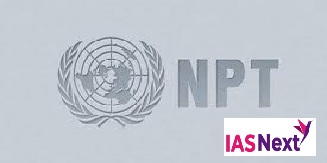CURRENT AFFAIRS
Get the most updated and recent current affair content on Padhaikaro.com
The Treaty on the Non-Proliferation of Nuclear Weapons (NPT)
- IAS NEXT, Lucknow
- 06, Jan 2022

Reference News:-
Permanent UN Security Council members China, France, Russia, the U.K. and U.S. have pledged to prevent atomic weapons spreading and to avoid nuclear conflict.
The statement was issued after the latest review of the Treaty on the Non-Proliferation of Nuclear Weapons (NPT) was postponed from its scheduled date of January 4 to later in the year due to the COVID-19 pandemic.
Latest issues:
Tensions between Russia and the United States have reached heights rarely seen since the Cold War over a troop build-up by Moscow close to the Ukrainian border.
That has raised fears that the Kremlin is planning a new attack on its pro-Western neighbour.
The rise of China meanwhile has also raised concerns that tensions with Washington could lead to conflict, notably over the island of Taiwan.
Beijing considers Taiwan part of its territory and has vowed to one day seize it, by force if necessary.
What is NPT?
The NPT is a multilateral treaty aimed at limiting the spread of nuclear weapons including three elements: (1) non-proliferation, (2) disarmament, and (3) peaceful use of nuclear energy. These elements constitute a “grand bargain” between the five nuclear weapon states and the non-nuclear weapon states.
The treaty was signed in 1968 and entered into force in 1970.
Implications:
States without nuclear weapons will not acquire them.
States with nuclear weapons will pursue disarmament.
All states can access nuclear technology for peaceful purposes, under safeguards.
Key provisions:
The Treaty defines nuclear weapon states (NWS) as those that had manufactured and detonated a nuclear explosive device prior to 1 January 1967. All the other states are therefore considered non-nuclear weapon states (NNWS).
The five nuclear weapon states are China, France, Russia, the United Kingdom, and the United States.
The Treaty does not affect the right of state parties to develop, produce, and use nuclear energy for peaceful purposes.
Role of states:
Nuclear weapon states are not to transfer to any recipient whatsoever nuclear weapons and not to assist, encourage, or induce any NNWS to manufacture or otherwise acquire them.
Non-nuclear weapons states are not to receive nuclear weapons from any transferor, and are not to manufacture or acquire them.
NNWS must accept the International Atomic Energy Agency (IAEA) safeguards on all nuclear materials on their territories or under their control.
Issues Pertaining to NPT:
Failure of Disarmament Process: The NPT is largely seen as a Cold War era instrument that has failed to fulfil the objective of creating a pathway towards a credible disarmament process.
System of Nuclear ‘Haves’ and ‘Have-Nots’: NNWS criticizes the treaty to be discriminatory as it focuses on preventing only horizontal proliferation while there is no limit for vertical proliferation.
NWWS also feels that the restrictions on Peaceful Nuclear Explosion (PNE) technology are one-sided.
India’s Stand on NPT:
India is one of the only five countries that either did not sign the NPT or signed but withdrew, thus becoming part of a list that includes Pakistan, Israel, North Korea, and South Sudan.
India always considered the NPT as discriminatory and had refused to sign it.
India has opposed the international treaties aimed at non-proliferation since they were selectively applicable to the non-nuclear powers and legitimised the monopoly of the five nuclear weapons powers.